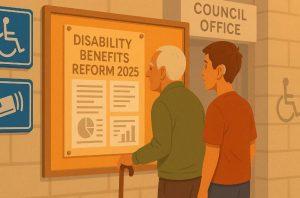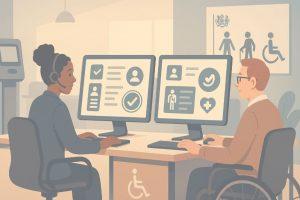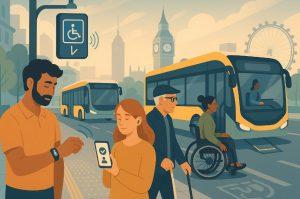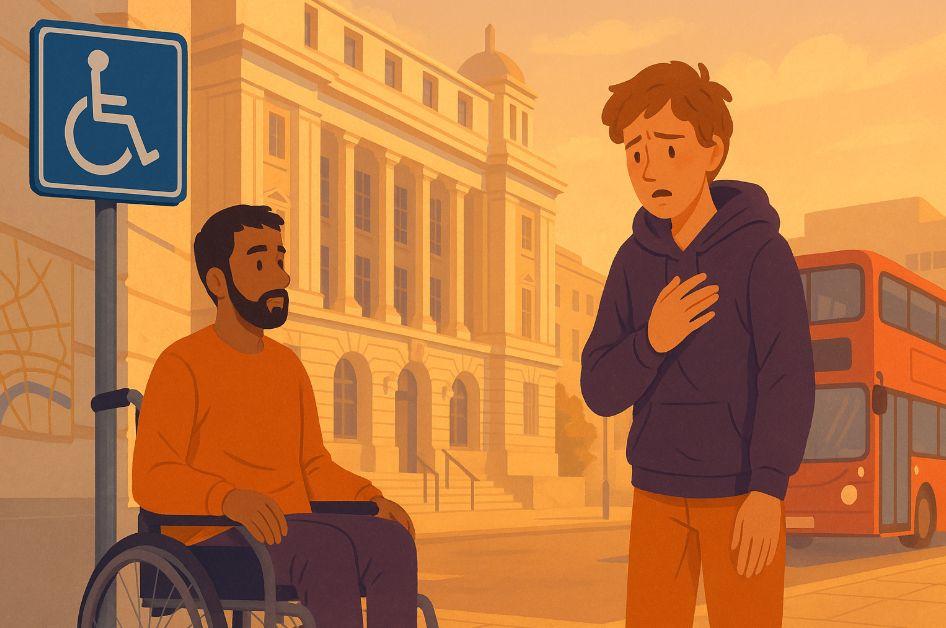With the UK government unveiling its latest disability welfare reforms in 2025, the Personal Independence Payment (PIP) and Blue Badge schemes are undergoing significant changes. These updates are especially crucial for disability claimants in London, where access to transportation and benefits directly impacts daily living.
As the Department for Work and Pensions (DWP) aims to modernise and streamline the system, understanding these reforms becomes essential for all stakeholders from claimants and carers to local authorities and health professionals. This article explores what the PIP Blue Badge welfare changes entail, how they affect eligibility, and what support systems are available.
What Are the Latest Changes to PIP and the Blue Badge Scheme in 2025?

Overview of PIP Adjustments
The Personal Independence Payment (PIP) a key financial support for people with disabilities has been revised to better reflect both physical and mental health needs. One major shift is the greater inclusion of “hidden disabilities” like anxiety, autism, and cognitive impairments in the mobility component assessment. The updated assessment guidance enables more consistent decisions across cases.
Updates to the Blue Badge Scheme
In tandem, the Blue Badge scheme which offers free or reduced parking for people with disabilities has undergone its own transformation. The new guidance now explicitly incorporates mental health considerations, such as sensory overload and panic attacks, when determining eligibility.
Implementation Timeline
These changes began rolling out in Q2 of 2025, with full enforcement expected by early 2026. After June 2025, applications will be evaluated using the updated framework.
How Will These Changes Affect Disability Claimants in London?
UrbanSpecific Impacts
For Londoners, these changes are particularly impactful. Urban transport infrastructure poses challenges for many disabled individuals, and the Blue Badge is a crucial tool for maintaining independence. Changes in eligibility may widen access for those previously denied but could also tighten regulations for others.
BoroughLevel Adjustments
Some London boroughs, such as Camden and Tower Hamlets, have already piloted these changes and reported increased demand for reassessments. Boroughspecific transport and parking regulations are being updated to align with national reforms, which may lead to discrepancies in processing times and service delivery.
What Are the New Eligibility Criteria for PIP and Blue Badge Applications?
PIP Eligibility Reforms
Under the 2025 system, PIP applicants will face revised eligibility checks, including enhanced questions around:
- Mental health conditions impacting mobility
- Daytoday functional limitations
- Frequency and intensity of symptoms rather than diagnosis alone
A person’s capacity to carry out particular duties will be given greater weight in functional assessments than a rigid list of medical issues.
Blue Badge Eligibility Revisions
For the Blue Badge, changes include:
- A broader definition of “nonvisible” disabilities
- Standardisation across councils on how applications are reviewed
- Requirements for updated medical documentation from specialists
How Is the DWP Handling the New Disability Reforms?

Strategic Rollout
The Department for Work and Pensions has implemented a phased rollout to manage the reforms. Staff have undergone additional training, and digital platforms have been upgraded for smoother claims processing.
Communication and Transparency
The DWP has introduced public information campaigns, updated website content, and a hotline to address queries. However, advocacy groups have raised concerns about accessibility for claimants without digital literacy.
Handling Appeals and Disputes
With the new rules, there is a streamlined process for lodging appeals, and claimants are encouraged to use mediation services where possible. A new online portal allows realtime tracking of appeal status.
How Can Disability Claimants Prepare for the Welfare Adjustments?
Reviewing Existing Claims
Claimants are advised to reassess their existing PIP and Blue Badge documentation to ensure alignment with new criteria. This includes updating medical records and functional assessments.
Seeking Professional Guidance
Many organizations offer advice services, including Disability Rights UK and Scope.
They can assist with application preparation, appeal documentation, and navigating changes specific to London.
Document Preparation
Applicants should compile:
- GP and specialist letters
- Personal statements detailing daily struggles
- Evidence of past assessments or hospitalisations
Are There Alternatives or Additional Support for Those Affected?
Mobility and Transport Schemes
Londonbased alternatives include:
- Taxicard scheme (subsidised taxi fares)
- Freedom Pass (free travel for disabled residents)
- Community transport networks
Other Financial Support
In cases where claimants are no longer eligible for PIP or the Blue Badge, they may qualify for:
- Employment and Support Allowance (ESA)
- Universal Credit with limited capability additions
- Local council discretionary grants
Emotional and Peer Support
Many community centres across London now offer peer support groups for disabled individuals, helping them navigate the emotional toll of benefit reviews and denials.
What Does the Future Look Like for Disability Welfare in the UK?

Policy Evolution
Looking forward, the government has indicated that welfare assessments will continue to evolve. A shift toward digitisation, predictive analytics in eligibility, and AIdriven claims processing is anticipated though these raise both hopes and concerns among stakeholders.
Voices from the Community
Disability advocates have welcomed the inclusion of mental health in mobility assessments but caution that implementation needs robust oversight. Concerns about digital isolation and reports of inaccurate assessments persist.
Comparison of PIP and Blue Badge Criteria (2024 vs 2025)
| Criteria | 2024 Policy | 2025 Update |
| Mental Health in Mobility Assessment | Considered only in limited cases | Fully integrated into core mobility component |
| Blue Badge for NonVisible Disabilities | Inconsistent council application | Standardised nationally with clear definitions |
| Assessment Tools | Facetoface or phone assessments | Addition of videobased and hybrid assessments |
| Documentation Required | Basic GP letters accepted | Comprehensive specialist reports encouraged |
| Processing Time | Average 12–14 weeks | Target reduced to 8–10 weeks |
| Appeal Rights | Tribunal hearing as final step | New mediation step before tribunal |
| Digital Accessibility | Paper and telephone preferred by many | Push toward online portals and automated tracking systems |
Conclusion
The 2025 PIP and Blue Badge welfare changes represent one of the most significant shifts in UK disability support in recent years. For Londoners living with disabilities, staying informed and proactive is essential.
While the inclusion of mental health in eligibility assessments is a welcome step forward, challenges remain particularly in application clarity and processing efficiency. By understanding the reforms, preparing the right documentation, and seeking expert advice, claimants can better navigate this evolving welfare landscape.
FAQs
What is the connection between PIP and the Blue Badge Scheme?
PIP assessments influence eligibility for a Blue Badge, particularly through the “mobility” component. Those who receive eight or more points for “moving around” may be immediately eligible.
How do I check if I’m still eligible after the 2025 changes?
You can use the DWP’s eligibility checker or consult with your local council. Updated tools now consider both visible and nonvisible disabilities more accurately.
Will it be more difficult to access the Blue Badge scheme?
While requirements are stricter in terms of documentation, the inclusion of hidden disabilities may allow more people to qualify under the right conditions.
Are there any changes for carers or support workers?
Though the reforms focus on claimants, carers may see indirect changes, especially regarding application assistance and accompanying duties.
What happens if my application is delayed?
Standard processing is 8–10 weeks. Delays may occur due to high volumes or incomplete documentation. Always track your application online and follow up promptly.
Can I still apply for PIP if I was previously rejected?
Yes, especially under the 2025 rules. Past rejections may no longer apply if your condition meets the new eligibility criteria.
Where can I get free legal or benefits advice in London?
Organisations like Scope, Disability Rights UK, and Citizens Advice offer free advice. Local borough councils also have dedicated disability benefit teams.









Leave feedback about this